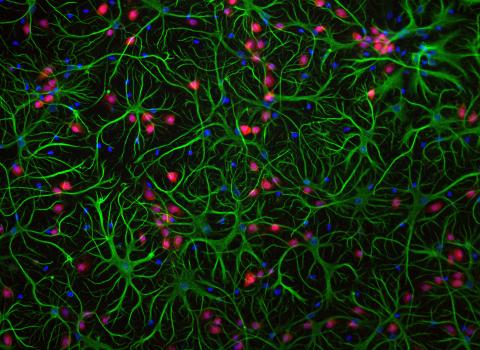
Neurodegenerative diseases: the links between astrocytes and neuropsychiatric symptoms
Researchers at the Laboratory of neurodegenerative diseases: mechanisms, therapies, imaging (LMN - Université Paris-Saclay, CEA, CNRS) are introducing a new approach to the study of these diseases, which are usually explored from a neural perspective. They propose to broaden the analysis to include glial cells known as astrocytes.
Neurodegenerative diseases, such as Alzheimer's, Parkinson’s and Huntington’s, are diseases which affect the central nervous system, the symptoms of which worsen over time. Although these diseases are associated with disabling symptoms, such as memory loss in Alzheimer’s, or problems with movement in Parkinson’s, they can also lead to early neuropsychiatric disorders (depression, apathy, irritability, anxiety and hallucinations, etc.) which contribute to a reduced quality of life for patients. Recent publications point to the importance of considering neuropsychiatric symptoms as factors which exacerbate the progression of neurodegenerative diseases. These factors are often poorly managed by existing drug therapies, especially in older patients. Until recently, studies into neurodegenerative diseases focused mainly on neurons. However, researchers Lucile Ben Haim and Carole Escartin from the Laboratory of neurodegenerative diseases (LMN - Université Paris-Saclay, CEA, CNRS) are putting forward the idea of looking beyond neurons. Based on the most recent literature published in this area, they are advocating the importance of taking a closer look at glial cells, such as astrocytes.
Glial cells and neurons: special partners
Glial cells surround neurons. They regulate the neurons’ immediate environment and have the role of managing how nerve cells function and of maintaining their equilibrium. For example, glial cells provide neurons with nutrients and help eliminate their waste. There are several types of glial cells, including astrocytes which make up the macroglia. Researchers at LMN are particularly interested in these star-shaped cells, although neurons need all the other glial cells too. Lucile Ben Haim explains it all as follows. “Astrocytes interact very closely with neurons. Any alteration in the astrocytes will therefore affect the proper functioning of the neurons.” As a result, they can contribute to the adverse effects seen in pathological conditions. In neurodegenerative diseases such as Alzheimer’s, several studies have shown that astrocyte-neuron interaction is abnormal and contributes to memory deficits in mouse models.
Is there a link between astrocytes, neuropsychiatric symptoms and neurodegenerative diseases?
More recently, several studies highlighted by the researchers at LMN have shown that an alteration in the astrocytes (brought about by using different experimental approaches) in the brains of laboratory animals leads to the development of neuropsychiatric symptoms. This involves a decrease in the expression of proteins necessary for the proper functioning of astrocytes and their interaction with neurons. Lucile Ben Haim and Carole Escartin are putting forward the hypothesis that an alteration in the neuron-astrocyte relationship underlies the neuropsychiatric symptoms in neurodegenerative diseases. They are inviting the scientific community to study the missing links between astrocytes, neuropsychiatric symptoms and neurodegenerative diseases.
A promising project
This is the aim of the research project recently launched by the two researchers which specifically targets astrocytes in the treatment of depressive symptoms linked to Alzheimer's disease. The goal is to re-establish the relationship between neurons and astrocytes and to determine whether, by manipulating the astrocytes, it is possible to reduce the early neuropsychiatric symptoms or even influence the later cognitive symptoms of the disease. A key challenge for the project is developing gene therapy tools which can re-establish this relationship.
The work is still in its early stages, but the hopes it raises for patients are immense. The study of neurodegenerative diseases using glial cells is still largely in its infancy. However, this field of study is likely to have much to contribute.
Reference:
Lucile Ben Haim, Carole Escartin, Astrocytes and neuropsychiatric symptoms in neurodegenerative diseases: Exploring the missing links, Current Opinion in Neurobiology, Volume 72, 2022, Pages 63-71.
